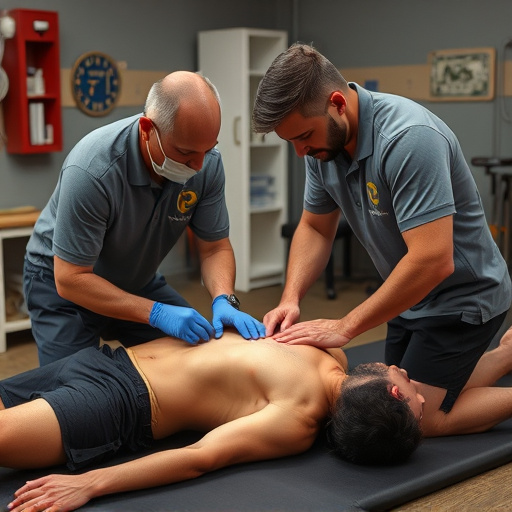Federal workplace injuries don't just cause physical harm—they often trigger a complex emotional journey for survivors, impacting mental health, daily life, and identity. Recognizing these challenges is crucial for supporting affected workers through anxiety, depression, and PTSD. Effective coping strategies including therapy, exercise, and rehabilitation services help individuals process trauma, regain mobility, and return to work with confidence. Strong support systems and professional care, such as chiropractic treatments, play a vital role in facilitating this transition.
Experiencing a federal workplace injury can trigger profound emotional turmoil, impacting not just physical recovery but also mental well-being. This article delves into the complex emotions that often accompany such incidents, exploring how they manifest and persist long after the initial harm. We discuss psychological effects, coping strategies, and available support systems to foster resilience among affected individuals. Understanding these aspects is crucial for navigating the emotional landscape of a federal workplace injury and promoting holistic healing.
- Understanding the Emotional Turmoil After a Federal Workplace Injury
- The Long-Term Psychological Effects and Coping Mechanisms
- Support Systems and Resources for Recovery and Resilience
Understanding the Emotional Turmoil After a Federal Workplace Injury

After a federal workplace injury, employees often find themselves navigating uncharted waters, experiencing a whirlwind of emotions. The initial shock and disbelief slowly give way to feelings of frustration, anger, and anxiety about the future. This emotional turmoil is a natural response to the sudden change in circumstances, especially for those who have been accustomed to an active lifestyle or held specific roles within their federal agency. The transition from being a productive member of the workforce to dealing with pain, limitations, and the potential for long-term disabilities can be profoundly disorienting.
The impact extends beyond physical symptoms like neck pain relief or managing soft tissue injuries through rehabilitation. It touches every aspect of life, affecting mental health, relationships, and even personal identity. Employees may struggle with feelings of helplessness, especially if their ability to perform daily tasks changes significantly. Understanding these emotional responses is crucial in providing adequate support for federal workers who have suffered workplace injuries, ensuring they receive not just physical care but also the psychological assistance needed for a successful recovery and return to work.
The Long-Term Psychological Effects and Coping Mechanisms

A federal workplace injury can have profound long-term psychological effects on affected individuals. Beyond the initial shock and physical recovery, survivors often grapple with heightened anxiety, depression, and post-traumatic stress disorder (PTSD). These mental health challenges can arise from the fear of re-injury, concerns about return-to-work capabilities, or the emotional toll of navigating complex legal processes related to federal workplace injury claims.
Coping mechanisms play a vital role in managing these psychological impacts. Engaging in therapy, joining support groups, and adopting stress management techniques like mindfulness meditation or regular exercise can help individuals process their trauma and rebuild resilience. Additionally, access to comprehensive rehab services, including functional rehabilitation focused on back pain relief, can facilitate a smoother transition back to work and foster a sense of empowerment and independence.
Support Systems and Resources for Recovery and Resilience

Recovering from a federal workplace injury can be challenging, but it’s during these times that support systems and resources become invaluable. Colleagues and friends play a crucial role in this process, offering emotional backing and practical assistance as the injured worker navigates their journey to recovery. Many organizations also provide dedicated programs tailored to support employees affected by work-related injuries, ensuring they feel valued and connected even while unable to work.
In addition to these social networks, there’s a range of professional services available. Non-invasive treatment options like chiropractic care have gained popularity for their effectiveness in managing soft tissue injuries. These alternative approaches can complement traditional medical treatments, helping individuals find relief and regain mobility. With access to the right resources, those who’ve experienced a federal workplace injury can foster resilience, accelerate recovery, and ultimately return to their professional roles with renewed confidence.
A federal workplace injury can have profound emotional impacts, extending far beyond the physical recovery process. Understanding these effects and accessing available support systems are crucial steps towards fostering resilience. By recognizing the long-term psychological consequences and leveraging resources designed to aid healing, individuals can navigate their journey toward emotional recovery and build a stronger, more resilient future despite the challenges posed by a federal workplace injury.














